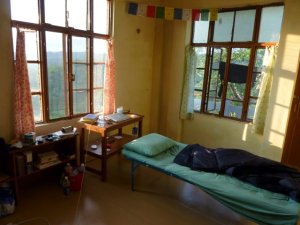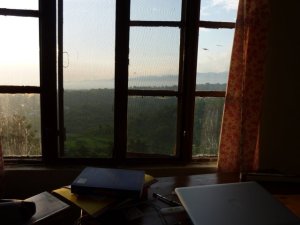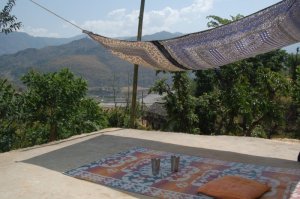Crazy drokpa in San Francisco
I step out onto the fire escape from my 4th floor bedroom for some fresh nighttime air. To preserve what little warmth was being thrown off by my Californian energy-efficient heater, I push the window back in. A few minutes later and I’m tugging at the window to open it; gently at first but harder and harder as I grow more worried. At one point I realize that if the window opened suddenly, it would be a short lived victory as I tumbled backward over the low railing of the fire escape. Positioning myself more safely, I continue pulling on the window and then try the adjacent windows in vain. My thoughts alternate between ways to get back into the apartment and the specter of ending my short spell on earth while executing one of these maneuvers less than skillfully. In the end I decide tonight is going to be my introduction to The Fire Escape.
I start climbing down the steps, getting glimpses into warm, well lighted living rooms along the way. Thankfully no one notices me. The steps seem to end on the first floor but then I notice the accordion-style final section of the fire escape and some straightforward instructions for lowering it to the ground. After unwinding the cables for a while, I release the lever to lower the ladder faster. Bad idea. Throwing my hands into the path of the wildly unwinding lever, I manage to avoid having the ladder crash loudly onto the ground. Thankfully I had reacted quickly enough that the unwinding hadn’t picked up enough speed to break any bones. I begin climbing down this final set of steps.
“What are you doing?” someone shouts.
“Got locked out of my apartment. Have to get back in this way.” I reply calmly.
“What apartment are you in?”
Not wanting this little incident reported to my landlord I respond with, “Don’t worry about it, not a big deal.”
“I’m the building manager,” he says.
Oops.
I explain what happened and that I’m just going to use my keys to get back in from the ground floor. Maybe he thought I was a burglar before? I’m now on ground level and there is a door here but no keyhole. I explain this to the Super. He says probably the easiest way is for me to get back in through his apartment. I climb back up the fire escape to the first floor. The Super asks me to pull the ladder back up…quite a workout and just deserts for my shenanigans I suppose.
“Not the best of circumstances to meet but I’m…,” I offer, after entering his apartment through the window. He doesn’t respond, not to be rude I think. Maybe he is just too startled by this crazy guy standing in front of him. I apologize for disturbing him, offer thanks and exit the apartment.
If you could meet anyone…
While returning to Sarah College from McLeodgang, I ran into a student of mine from English class. As an exile Tibetan, particularly one who has moved mostly in non-Tibetan settings (Indian boarding schools, American universities and workplaces), my interactions with Tibetans from Tibet has been limited. And one of the things I’m really enjoying at Sarah is the chance to talk with Tibetans my age who were born and raised in Tibet. So I asked NT why he had made the trek into town. NT left Tibet, his parents and his siblings eight years ago.
`To call my family,’ he said. `I call them about once a month.’
`And how are they doing?’
`They’re doing well. But my parents want me to come back.’
`Why? You went through a lot of trouble to leave Tibet, why are they asking you to come back?’
`Well my parents are getting old and they are worried about not seeing me before they die.’
The conversation left me intensely angry and sad.
The other day, I was leading one of my classes in English conversation practice. The topic was: `If you could meet anyone in the world, who would you meet?’ The first person I asked picked George Bush. Why? He wanted to ask Bush why he had not tried to do more for Tibet.
Next person: `I would like to meet my mother because she cares a lot for me and I have not meet her for many years and I miss her.’
Next: `My father because I have not seen him after I was a baby.’
Next: `My family because I miss them a lot and I have not meet them since six years.’
I had expected to hear my students say they wanted to meet the rich and famous.
`So…,’ I flailed about and finally asked one of the students, `can you tell us something about your mother?’
My question brought this monk in his mid-twenties to the verge of tears. The rest of the class, including myself, were now in serious danger of some sniffling and crying. So I changed the subject to something else and made it safely to the end of class.
p.s. I will write a later post about why these students chose to leave Tibet in the first place
Technology, how I love thee!
I decided to take six months after graduation to study Tibetan before starting work. And so here I am at Sarah College for Higher Tibetan Studies near Dharamsala. Thus far I’m loving it! I live in the dorms with the other students, mostly Tibetans mostly studying for a bachelors degree in Tibetan studies. The living quarters and food situation is fairly basic but it’s a small price to pay for being able to spend 5+ hours every day studying Tibetan, without much else to distract me, particularly since we are surrounded by rice paddies and not much else.
To get on to the original subject of my post. Technology. And how awesome it is. To truly appreciate it, think of those poor missionaries in remote places in the 18th century, trying to learn the local tongue to convert the heathens. Leave aside all the tech-enabled tools of today, those guys didn’t even have decent texts, often literally having to write the book themselves.
With your motivation fortified by that thought, I give you some of my favorite Tibetan language tools:
1) A good Tibetan-English digital dictionary is essential. I have Rangjung Yeshe’s Tibetan-English Dictionary which integrates very nicely into the built-in Mac dictionary program. To look up the meaning of a Tibetan word, simply type in Wylie and viola!*
2) Online Tibetan-English dictionary: http://www.thlib.org/reference/dictionaries/tibetan-dictionary/translate.php. This is a great dictionary. You can even paste in several Tibetan sentences and the dictionary will segment the words appropriately. The Tibetan & Himalayan Library, which hosts this dictionary, also has a bunch of media and materials at http://www.thlib.org/
3) Flashcard program: What’s a language learner without her flashcards? Anki is a versatile – and free! – program for managing a collection of digital Tibetan flashcards. http://www.ichi2.net/anki/ You can import a bunch of words at a go by inputting them into a tab delimited text file.
(edit: I’m adding my Anki flashcards, feel free download them below. I think one of the files has more Buddhist terms from my class and one of them is more colloquial)
4) Listening practice: The Tibetan services of Radio Free Asia (http://www.rfa.org/tibetan/) and Voice of America (http://www.voanews.com/tibetan/news/) are a great way to practice listening to Tibetan.
4) Blogs: For practice reading Tibetan, a couple of sites to try:
http://www.highpeakspureearth.com/ (This is not in Tibetan but has great Tibet related coverage in English)
*I use a Mac and Mac OSX 10.5 and on supports Tibetan input beautifully. Just go to System Preferences / Language & Text / Input Sources and enable one of the following keyboards: Tibetan Otani, Tibetan QWERTY, Tibetan Wylie. I use Wylie. For older Mac versions or PC, googling will turn up a ton of information on how to input Tibetan.
We shall overcome
I obsessively read the news from Tibet. Most of the time it is a depressing variation on the theme of the Chinese state systematically trying to crush Tibetans: forced relocation of Tibetan herders, signs outside Tibetan schools declaring “I am a child of China, I like to speak Mandarin”, imprisonment of Tibetans merely trying to preserve their culture. Those who more directly challenge Chinese designs in Tibet, face far worse consequences.
Honestly I find this deeply depressing.
But the response of Tibetans to oppression, our response as writers, musicians, activists, and ordinary folk, rallies me for the fight. Against brutality and force, we have the music of Rangen Shonu, the eloquence of Woeser, the courage of Dhondup Wangchen…the spirit of the Tibetan people.
I also find tremendous inspiration in the struggles that have taken place in other times and places. I get goose bumps listening to Martin Luther King Jr or watching grainy footage of Gandhi’s marches or reading about Black South Africans’ struggle. Thus fortified, I say: game on China, game on.
stream of consciousness…internet edition
While browsing my e-mails I came across a post by Tibetan dissident writer Woeser characterizing Chinese and Tibetan relations as one between a master and a pet. Discussing the faddish adoption of Tibetan material culture by some Chinese, Woeser brings up the example of the Chinese nouveau rich who keep Tibetan mastiffs as pets (the demand from these tycoons has stoked prices for some of these dogs to over half a million dollars!).
I looked up the Tibetan mastiff in Wikipedia and found this wonderful nugget of information:
Marco Polo encountered the large Tibetan dogs in his travels and described them as “tall as a donkey with a voice as powerful as that of a lion.”
I tried to imagine how awestruck Marco Polo’s fellow Venetians – and their children – must have been upon hearing that description. I enjoy living in the age of extensive and accessible information but sometimes I regret not being able to approach life with the wonder and imagination that can only arise when much about the world is unknown, in whose vast unexplored spaces exist dogs tall as donkeys and powerful as lions.
A promising writer in the family…
I don’t mean myself of course. This poem was written by my sister:
Tea
Dim hallways display ancient treasures
Of the dead and decayed
Preserved forever behind glass panels
King Tut’s cup, Cleopatra’s asp arm band
Neatly labelled and nicely litAmong stucco walls of a sombre room:
“The Hall of Asian Peoples”
I chance upon a curious display- a recreated scene from a Tibetan house
I look close and see myself
Behind the glass, two figures stand
One dressed like Mother, the other stands like Father
Scattered around them are things we use:
Colorful thangkas, porcelain cups, prayer wheels and wool rugs
The description reads: Tibetan couple having tea in their parlourAmong the dead, we live
Among the decayed, we drink tea
City slickers, here’s how your rice is grown…at least in Nepal
Rice planting season began a couple of weeks ago. The fields all around us underwent several distinct transformations. First, the landscape was charred black as the old vegetation was burned down. Then manure was brought from cowsheds and deposited in orderly rows, making the fields look like giant sets of some strange board game.
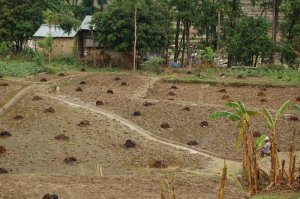
Then it was time to plough! “We don’t have tractors and machines here,” our nightwatchman explained. I watched the men guide their powerful beasts expertly, shouting at the oxen when making a particularly tight turn on their narrow plots of land.

The fields were then flooded.

And soon enough the mud yields beautiful, green rice shoots…

This and that
I’ve been keeping a grandfatherly daily schedule in Achham. Up at sunrise, asleep by 10pm. I used to study Mandarin in the mornings but recently I’ve switched to Tibetan. Other than occasional lessons during vacations, I didn’t study Tibetan formally so I can’t really read or write the language. Being a native speaker is definitely aiding my self-study efforts and making the process fun rather than frustrating. For instance, yesterday I realized that for years I had used the Tibetan word for `chair’ [`Kub-kya’] without noticing it literally means `Butt-raiser’ 🙂
…
I’ve discovered the joys of open air bathing. Instead of lugging water uphill and then showering in our tin-shed (it’s beastly hot these days), I now take my bucket down to the stream, fill up and shower in my swim trunks. Sometimes it’s just me at the stream, birds chirping overhead in the surrounding trees. Other times I am joined by village women fetching water and troops of schoolchildren curious about my bathing technique.
…
I started a book called Global Values 101. Some of the interviews in the book are interesting and thought provoking, but some of the discussion about `changing the world’ is fuzzy and not very inspiring about concrete steps individuals can take to contribute to this colossal task. One interviewee had interesting and straightforward advice though. Instead of going to law school, she suggested, figure out how to influence people’s consciousness. “Write plays, write fiction, write journalism, make rock videos,” she said.
24 hours with a government doctor…
“Let’s all go to Mangalsen” Dr. T’s friend proposed. “I’ll finish the autopsy in an hour and we can eat, have a beer and check out the place.” Dr. T didn’t seem very enthusiastic. Travelling to Mangalsen entails a dusty, bumpy six hour ride because the road isn’t paved. But I was curious to see Mangalsen, headquarters of Achham district and the site of one of the bloodiest firefights during the Maoist uprising. I also thought it would be a good break from the monotony of village life for Dr. T. And then there was the promise of beer.
Dr. K worked in a government hospital nearby. He had been summoned for the 12-hour round trip to Mangalsen to conduct an autopsy because the only government doctor in the district of 250,000 people was on leave. We travelled in an air-conditioned government jeep so the ride was bumpy but relatively comfortable. I’m sure Dr. T felt similarly, he had once walked to Mangalsen and returned via public bus to Sanfe covered from head to toe in dirt and dust. So the government perks and infrastructure on display felt relatively luxurious. But only because our little NGO runs a really tight ship.
We got to Mangalsen late in the evening and were greeted by some of the administrative staff of the hospital. I was surprised by the respect accorded to what were after all a pair of 26 year olds. The much older government bureaucrats attended carefully to the doctors’ instructions and appended the honorific `Sahib’ when they addressed the doctors. Also, while everyone likes to sneer at government bureaucracies, I was impressed with the sense of order instilled by all the processes in place, honed through decades of experience; at our clinic, I sometimes feel like we are running by the seat of our pants. But for all the formality and orderly processes, the hospital in Mangalsen is run down and gloomy. The dark corridors were dirty, linens for patients were non-existent, and an ancient x-ray produced images that were borderline useless.
We were told there were two autopsies to be performed for homicide investigations. It looked like we would have to stay overnight. “Want to watch?” Dr. K offered. I would have said no if I was merely curios. But I joined Dr. K hoping that an autopsy might shock me into recognizing my own mortality. I was quite apprehensive – would I throw up? be quite traumatized? – but I decided to accompany Dr. K. One of the bodies was supposed to be badly decomposed so before heading into the mortuary I made sure my surgical mask was very snug. I steeled myself and entered a small bare room. The first corpse was infested with maggots and had swollen up and turned black. The room was filled with a sickly sweet smell. The taut black skin framing the corpse’s swollen features made it seem like a slightly fantastical statue made from black marble. After a quick look, Dr. K decided the body could not offer any meaningful evidence. The next corpse was quite fresh and other than blood that had clotted in its hair and ears, the person looked like he was merely sleeping. Dr. K concluded the cause of death was a head injury. He needed a blood sample and when the jugular didn’t offer up anything, the assistant cut open the chest. The skin sounded like cloth ripping. Dr. K fished out the heart and through a small cut took his blood sample. There was no electricity so during all of this I was at work as the lighting assistant, my flashlight beam trailing the assistant’s scapel and doctor’s gloved hands.
15 minutes after leaving the mortuary we were sitting down to eat. I did not expect to have much of an appetite but I surprised myself by cleaning up my plate. No beer through because much of Achham is apparently a dry area. That night I wanted to fall asleep quickly but for a little while I was awake amid the snoring doctors, trying to put away the images from the autopsy. The next morning we returned from Mangalsen in a police vehicle. Dr. K was being asked to examine a 13 year-old rape victim waiting near our clinic before heading back to his hospital. The girl and her parents were waiting nervously When we arrived at the Police station. She looked much older than 13 and held her stomach as if in pain, primarily for our benefit I think. The accused rapist was apparently a 30 year old. After bidding Dr. K farewell at our clinic, Dr. T and I began our day’s work.
V for Vegetarian
Over the last few months I’ve chosen not to eat meat. With the shrink-wrapped, evenly-pigmented meat found in American supermarkets, one could be forgiven for thinking that chicken breasts grow on trees. But in Nepal meat occupies messy roadside counter tops and it is hard to avoid knowing that eating meat is a bloody business.
In Accham, I find it even harder to be a meat eater. I will admit that the meat here is of poor quality, with lots of bone, gristle and skin in the `meat’. But the I’m-eating-a-sentient-being part of the reason for going veg, is even more for convincing for me after interacting with some of the many domestic animals around here.
For instance, I came across a cute goat kid (below) on a hike to the abandoned hospital in Bayalpata.
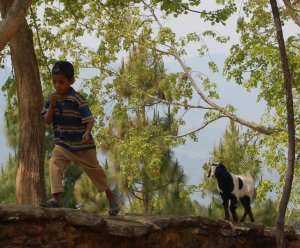
Santosh, one of the clinic staff members, showed us how playful goat kids can be. Press a palm against their heads and they will happily engage in a head-butting contest. I couldn’t imagine eating the kid or one of his relatives after that.
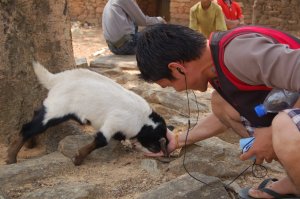

Although giving up meat is good for health (and for the environment), I began losing weight on my all veg diet. Part of it is also that Accham is a very poor region so there are only few different types of nutritious foods available here. I’ve added milk and eggs to my diet and started snacking often in between our two meals a day. My weight seems to have stabilized now. Given the poor food situation here, the rescue package (pictured below) from my parents recently was particularly welcome. mmmm!
No laundry at the river tomorrow so I’m going to spend all day relaxing on our terrace. Have a good weekend everyone!


